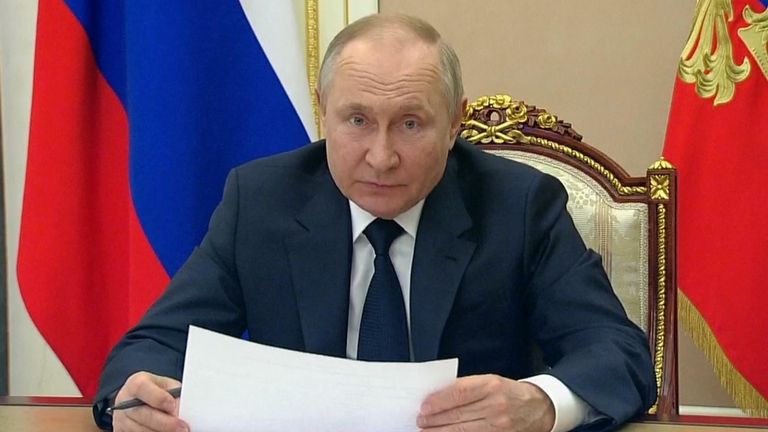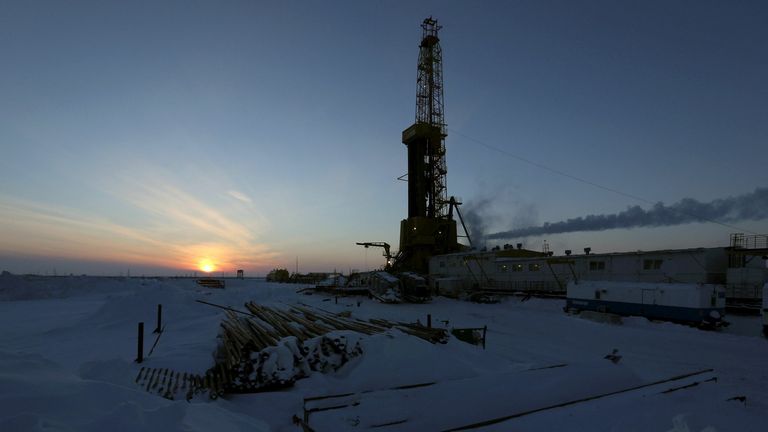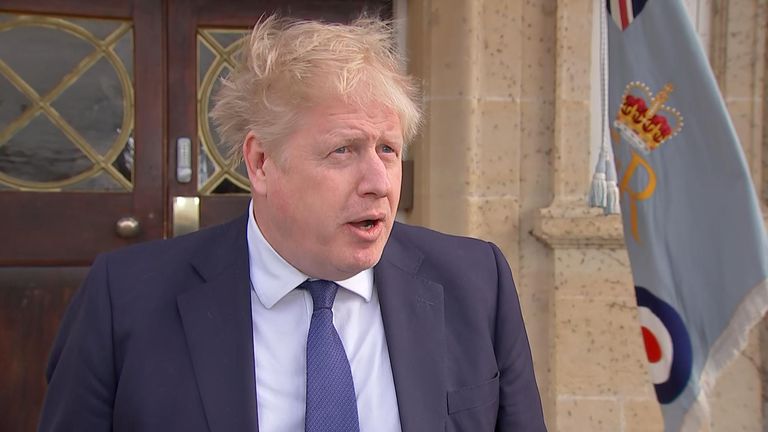Ukraine war: UK sanctions 386 Russian politicians who backed Putin’s invasion
The UK has announced sanctions on 386 Russian politicians who supported Vladimir Putin’s invasion of Ukraine, the Foreign Office has said.
The sanctions mean bans on travel to the UK and the freezing of assets for those members of the Duma, the lower house of the Russian parliament, who voted for the independence of separatist regions Luhansk and Donetsk.
Fears Putin’s forces could use chemical weapons in Ukraine – follow live updates
Key developments:
• Russian soldiers edge closer to Kyiv – as satellite images show large convoy ‘has dispersed’
• Boris Johnson has told Sky News it has been “deeply upsetting” to reject calls for a no-fly zone over Ukraine
• The UN Security Council meets today to discuss Russia’s claims that the US and Ukraine are developing biological weapons – despite firm denials from both countries
• Britons to be asked to welcome Ukrainian refugees into their homes
• Facebook is reportedly planning to allow posts that call for Vladimir Putin’s death in some countries
Boris Johnson’s government first announced its intention to target Duma members on 22 February.
Ministers have yet to target all the members of the Federation Council, the upper house of Russia’s parliament.
UK ‘will not let up’
Foreign Secretary Liz Truss said the UK was “targeting those complicit in Putin’s illegal invasion of Ukraine and those who support this barbaric war”.
“We will not let up the pressure and will continue to tighten the screw on the Russian economy through sanctions,” she said.
“Together with our allies, we stand firmly beside our Ukrainian friends. We will continue to support Ukraine with humanitarian aid, defensive weapons and diplomatic work to isolate Russia internationally.”
Speaking on Thursday, the foreign secretary said western countries need to continue doing more, including freezing all Russian bank assets and excluding Moscow from the SWIFT global payments system.
“We want a situation where they can’t access their funds, they can’t clear their payments, their trade can’t flow, their ships can’t dock and their planes can’t land,” Ms Truss said in a speech in Washington DC.
Downing Street has declined to say whether any of the Duma members subjected to these latest sanctions have any assets in the UK.
“The measures we put in place will ensure that any assets they do have in the UK will be frozen and they will no longer be able to travel to the UK or do any business here, but I wouldn’t go through the details of individuals,” a spokesman for Boris Johnson said.
‘This should have happened weeks ago’
Friday’s move means more than 800 Russian individuals, entities and subsidiaries have been hit with sanctions, the Foreign Office said, including 18 lead oligarchs with a combined worth over £30bn.
But opposition parties have accused the government of not moving quickly enough to introduce sanctions against Russian oligarchs, arguing the UK has been behind the EU and US.
Labour’s shadow foreign secretary David Lammy said the party welcomes the news that the government has “finally imposed sanctions on members of the Duma, but this should have happened weeks ago”.
He added: “Ministers must urgently implement the other sanction measures Labour has been calling for to cut Putin and his criminal cronies out of our economic system.”
Oligarchs hit with sanctions by UK government
The latest action comes after seven more Russian oligarchs with links to Putin were hit with sanctions by the UK government on Thursday, including Chelsea owner Roman Abramovich, who has previously denied having close ties with the Russian president.
Read more:
How Abramovich sanctions will affect Chelsea fans
The other six Russian oligarchs sanctioned are:
• Oleg Deripaska, who has stakes in En+ Group – a major extractives and energy company
• Igor Sechin, chief executive of Rosneft – a Russian state oil company
• Andrey Kostin, chairman of VTB bank – the second largest bank in Russia
• Alexei Miller, chief executive of energy company Gazprom
• Nikolai Tokarev, president of the Russia state-owned pipeline company Transneft
• Dmitri Lebedev, chairman of the board of directors of Bank Rossiya – widely considered to be the Kremlin’s private bank
For all the latest business News Click Here




